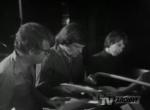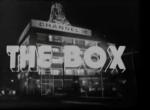AustLit
Latest Issues
AbstractHistoryArchive Description
Another Crawford Productions soap opera, The Box was set in a Melbourne television-production studio. According to Moran, in his Guide to Australian Television Series:
The setting for the continuous drama was a television station populated by a series of familiar types. These included Sir Henry Usher, chairman of the company; Max Knight, the harrassed station manager; Tony Wild, the egotistical star of the station's on-air detective series; the inevitable tea lady; Paul Donovan, a harrassed station executive, and many others. Most memorable of all was a wonderful bitch-figure in the person of reporter Vicki Stafford.
Like Number 96, The Box was designed for a late-night timeslot, and so focused on 'adult themes', including adultery and bisexuality.
Moran also suggests that The Box was 'very important to Crawford's in generating a cash flow at a time when they were losing the contracts on their police dramas' and that writers used the character of television police officer Tony Wild as 'an opportunity to settle the books against the egotism of some of the actors in Crawford's police series'.
Publication Details of Only Known VersionEarliest 2 Known Versions of
Works about this Work
-
We Studied Two Decades of Queer Representation on Australian TV, and Found Some Interesting Trends
2024
single work
column
— Appears in: The Conversation , 12 March 2024; -
A Future of Uncertainty: School, Class, Ethnicity, Gender and Power in Australian Television’s ‘chalk-operas’ of the 1970s
2023
single work
criticism
— Appears in: History Australia , vol. 20 no. 1 2023; (p. 98-117)'High school education underwent a radical change in Australia in the 1960s and 1970s, commensurate with the major changes experienced within other institutions and social environments. This article is an exploration of Australian television’s use of the schoolroom within drama during the 1970s, with a focus on three productions: 290 half-hour episodes of Class of ’74/’75, 39 hour-long instalments of Glenview High and a pilot for Jackson High, a one-hour show that was not developed but which proved to be a forerunner for Glenview High. The article demonstrates that such shows provide insight into attitudes to both schooling and to teenage life in Australia in the 1970s, as well as being in themselves important and engaging examples of early Australian television drama.' (Publication abstract)
-
A Future of Uncertainty: School, Class, Ethnicity, Gender and Power in Australian Television’s ‘chalk-operas’ of the 1970s
2023
single work
criticism
— Appears in: History Australia , vol. 20 no. 1 2023; (p. 98-117)'High school education underwent a radical change in Australia in the 1960s and 1970s, commensurate with the major changes experienced within other institutions and social environments. This article is an exploration of Australian television’s use of the schoolroom within drama during the 1970s, with a focus on three productions: 290 half-hour episodes of Class of ’74/’75, 39 hour-long instalments of Glenview High and a pilot for Jackson High, a one-hour show that was not developed but which proved to be a forerunner for Glenview High. The article demonstrates that such shows provide insight into attitudes to both schooling and to teenage life in Australia in the 1970s, as well as being in themselves important and engaging examples of early Australian television drama.' (Publication abstract)
-
We Studied Two Decades of Queer Representation on Australian TV, and Found Some Interesting Trends
2024
single work
column
— Appears in: The Conversation , 12 March 2024;
- Melbourne, Victoria,





